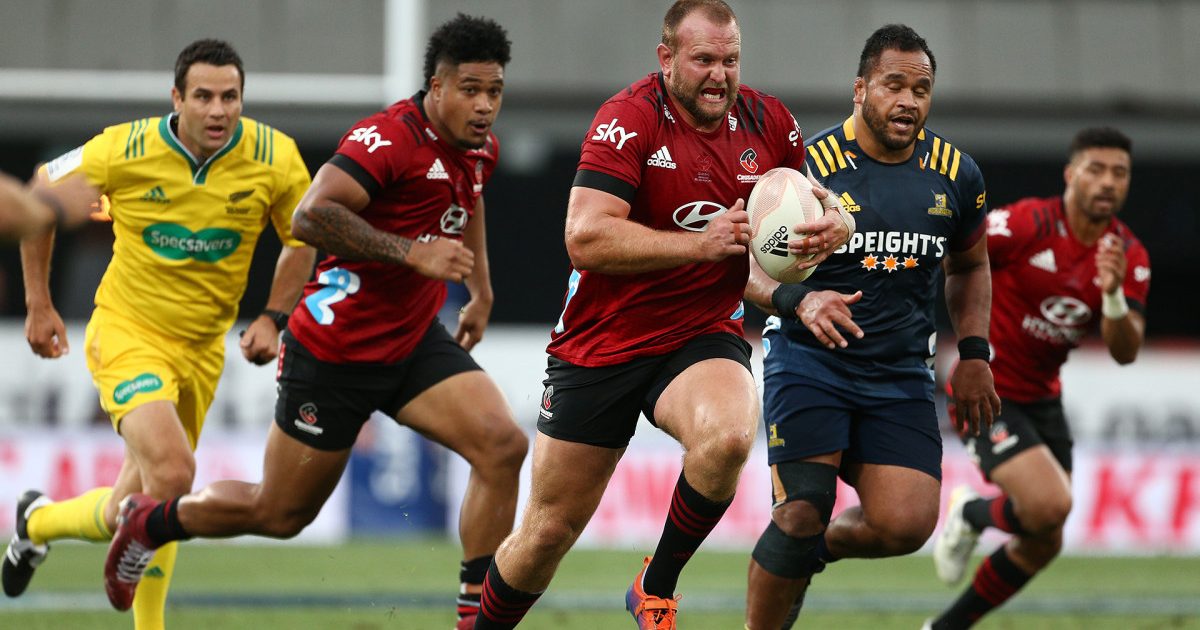Referee admits Joe Moody should have been yellow carded following Tony Brown outburst

Super Rugby Aotearoa referee Ben O’Keeffe has admitted he should have yellow carded Crusaders prop Joe Moody during his side’s clash against the Highlanders on Friday.
The Crusaders defeated their South Island neighbours 26-13 in the first match of the new season at Forsyth Barr Stadium in Dunedin.
The reigning champions littered their victory with a raft of penalties, though, conceding 15 infringements – almost double that of what the Highlanders conceded – as well as two yellow cards to Ethan Blackadder and Scott Barrett.
Highlanders head coach Tony Brown said post-match more should be done to penalise teams who commit multiple illegal acts as he described the state of rugby as “sad” and suggested Moody was “potentially” lucky not to have gone to the sin bin himself.
The 50-test All Blacks prop was caught in a scuffle with Highlanders lock Jack Regan early in the first half, landing multiple open-palmed strikes to the Irish debutant’s face at the side of the maul after Regan held onto Moody’s jersey.
In spite of Moody’s overzealous reaction, the Highlanders were only given a penalty for the indiscretion, while players from both teams were talked to by O’Keeffe.
Speaking on The Breakdown on Monday, O’Keeffe conceded that, after revisiting the incident during a referees’ review session, he should have issued Moody with a yellow card for his actions.
“My phone was going nuts straight afterwards,” O’Keeffe said. ““We had our review today and that was one of the big talking points, how to manage that at the time and what was the right outcome.
“We worked out that going through the process that Joe Moody should have been yellow carded for striking to the face.
“That’s really the standard we want to be able to set that if you’re going to be doing something deliberate like that off the ball, you should be yellow-carded for that.
“I was the referee at the time and, at the moment, I made a call based on what I felt was correct in that situation.
“I was going to give it a penalty, talk to both men and both captains, calm the game down and crack on and play some rugby, but that’s the benefit of reviews.
“You sit down and look at the process and the outcome of that is he should have had 10 minutes in the bin.
“As a group of referees, we all learned from that and that’s the standard, so if we see that later in the competition, they’ll be very lucky if they’re not going to be yellow-carded.”
Major signing news! ? https://t.co/hmJ8f3YROR
— RugbyPass (@RugbyPass) March 1, 2021
Although well-intentioned, O’Keeffe’s admission that may further aggravate Brown’s frustrations given the wrong decision was made during the match.
Chiefs halfback Brad Weber told the Aotearoa Rugby Pod last year that he felt similarly frustrated following a string of officiating mishaps that contributed to the Hamilton franchise’s winless record in last year’s Super Rugby Aotearoa.
Weber and his teammates expressed outrage that the TMO wasn’t used to determine if Pita Gus Sowakula had scored a potentially match-winning try in the dying stages of their 21-17 defeat to the Blues in Auckland in round seven.
The week beforehand, New Zealand Rugby’s referees boss Bryce Lawrence apologised to the Chiefs after it was ruled Damian McKenzie had wrongly been disallowed a try in their 33-31 loss to the Highlanders in Hamilton.
Weber described the officials’ inability to make the right call on the field as “laughable” and said post-match apologies or acknowledgements that the referees got their decisions wrong doesn’t change the outcome of the match.
“We’ll certainly give the Crusaders a heck of a crack this weekend, but it’s frustrating getting apologies from referees saying they got key moments wrong,” Weber told the Aotearoa Rugby Pod last July.
“At the end of the day, it doesn’t matter for us, because we still get a loss in the loss column.
“So, as much as we appreciate them admitting that they might have got something wrong, that sort of doesn’t help our fortunes at the moment.
“You’d almost rather they didn’t say anything.
“I guess they know that they were wrong, and that confirms our thinking, that we’re not just complaining at nothing, it’s just frustrating that we’re not getting any of those calls run our way.”
Force lock Jeremy Thrush is expecting the Waratahs to “come out swinging” on Friday, which he said could work into his side’s favour.#superrugbyau #WARvFORhttps://t.co/rul8F9WnNi
— RugbyPass (@RugbyPass) March 1, 2021
Meanwhile, O’Keeffe confirmed the right call was made to not award Jordie Barrett a conversion despite an uproar of confusion during the Blues’ 31-16 win over the Hurricanes in Wellington.
Barrett looked to have converted Asafo Aumua’s second try, which brought the hosts to within just five points of their opponents with little more than 15 minutes to play.
The kick was disallowed, though, despite it appearing to have curled through the uprights, leaving Barrett, the Sky commentary team, fans at the ground and social media users perplexed and outraged at the decision.
However, O’Keeffe said the camera angles were misleading as the ball had sailed directly over the top of the right-hand post, which means the correct decision was made to not award the conversion.
“If it goes directly over the post, which it did in this situation, then it’s no conversion,” O’Keeffe said. “We weren’t helped by the camera angles that came through after the game.”
Listen to the latest episode of the Aotearoa Rugby Pod below:





































